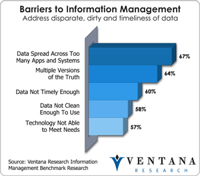Cisco Systems has announced its intent to acquire Composite Software, which provides data virtualization to help IT departments interconnect data and systems; the purchase is scheduled to complete in early August. Cisco of course is known for its ability to interconnect just about anything with its networking technology; this acquisition will help it connect data better across networks. Over the last decade Composite had been refining the science of virtualizing data but had reached the peak of...
Read More
Topics:
Big Data,
Networking,
IT Performance,
Operational Performance,
Business Analytics,
Business Intelligence,
Business Performance,
Cloud Computing,
Data Management,
Information Applications,
Information Management,
Cisco,
Composite Software,
Data,
Data Virtualization,
Information Optimization,
Internet of Everything,
Strata+Hadoop
The increasing volume of information within enterprises and on the Internet requires businesses to be smarter and more efficient in how they use it. One large challenge is navigating through information and access to the data underlying key business documents in a way that people actually think and operate. The traditional technology approach is defining a data model with a database and then mapping the data to it and is not capable of dealing with data from diverse unstructured information...
Read More
Topics:
Sales Performance,
Social Media,
Supply Chain Performance,
Sustainability,
IT Performance,
Business Analytics,
Business Collaboration,
Business Intelligence,
Business Mobility,
Business Performance,
Business Technology,
CIO,
Cloud Computing,
Customer & Contact Center,
Financial Performance,
Governance, Risk & Compliance (GRC),
Information Applications,
Information Management,
Information Technology,
Location Intelligence,
Operational Intelligence,
Workforce Performance,
Cambridge Semantics,
Data Virtualization,
Informatics,
Information Discovery









